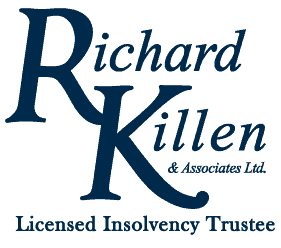How to Deal with Creditors during the Coronavirus Financial Crisis
Posted on: May 4, 2020Posted in Advice from Richard, Credit, Creditor Negotiation, Financial Advice | Comments Off on How to Deal with Creditors during the Coronavirus Financial Crisis

If you are one of the hundreds of thousands of Canadians who only have CERB support payments to get you through this unprecedented time, and you have monthly debt payments to keep up with, the fundamental question is: How do you deal with creditors in this coronavirus crisis if you are no longer able to pay meet your debt payments?
Here are several things you need to know when making payments becomes hard or impossible:
- If you miss a monthly debt payment one of the first things you need to know is that your creditors have the right to take action to collect payment from you. This means they can call you, take you to court, sue you, and eventually garnishee your wages.
- Creditors will try to collect from you directly as soon as you miss a payment. They will begin with a simple overdue reminder notice. If you miss a monthly payment on your credit card, for example, your bank or credit card company will give you an overdue notice on your monthly statement. If it remains unpaid, this will escalate to phone calls, emails, and other forms of direct contact as long as the creditor is dissatisfied with the situation as it stands.
- You can expect to receive automated late payment notifications as these are system generated messages. It’s important to be aware that creditors will likely continue to send out written notifications of late payments so they can take legal action against you as soon as the courts open.
- If you have generally been current with your payments the good news is that other than the notice on your next statement, you will not likely see collection activities starting immediately after your first missed payment.
- If you have not responded to late payment notices or made a payment on your debt, and your debt is 90 days past due or more, lenders may decide to refer you to a collection agency. Because of COVID-19, this is not likely to happen in the immediate future as many collection offices are shut down or working with limited staff.
- If delinquency remains unresolved too long, the creditor may take you to court (sue you). This will involve filing a statement of claim with the court and serving this document on you..You will have 20 days to dispute the claim, which gives you time to deal with the situation. This too is not an issue right now as the courts are closed, which means creditors cannot start filing any legal action until the courts open again. But they can start the ball rolling in that direction now, so when the court opens for business again, things will move quickly.
- If you receive collection calls and you can’t pay due to a job loss from COVID-19, you should always simply tell the truth. Tell the collector that you’ve been laid off work, and are not able to make payments right now. Though you may run into someone where the compassion gene skipped his or her generation, most collection agents will be prepared to work with you rather than confrontationally against you.
- If a creditor has a garnishee order filed against your wages and your only income comes from CERB support payments from the government, don’t worry, these support payments cannot be garnisheed or applied to debt repayments. Creditors cannot obtain a court order to apply a wage garnishment on social assistance payments, government pensions or support payments. Garnishees apply only to employment income.
- However, if you have a bank account and owe money to that bank, on a credit card or a loan for example – then that bank can take payment out of your account without a formal garnishee and without your permission to apply to any overdue payment. To avoid this situation it would be a good idea never to do your banking where you owe any money. If you feel vulnerable right now due to the Coronavirus and want to change your deposit bank you may consider opening an account at an online bank.
- Finally, if you are in need of protection from your creditors’ efforts to force payment through garnishment or other collection activity, you do have the right to use the Bankruptcy and Insolvency Act and do a bankruptcy or a consumer proposal. In order to explore that option to see if it’s the right one for you, a meeting with a Licensed Insolvency Trustee like Richard Killen & Associates Ltd. will be the next step. During coronavirus time this is now possible by telephone or teleconference.
Communicate with your Creditors

The best way to deal with creditors during this coronavirus financial crisis is to talk to them. It’s crucial that you take action quickly and make the first move to contact them and find out what your lenders can do to help you. The key is to act quickly, as soon as you realize you may miss a payment.
The worst thing you can do is ignore your creditors. Lenders won’t know that you need help if you don’t tell them. Payment deferrals, loan extensions, revised terms or even reduced interest rates are all things your lenders can offer as a temporary solution. But they’ll need to assess your financial situation first. They will take into account your payment history, how soon you seek help and your recent credit behaviour and a number of other factors. If you’ve waited too long and have slipped too far behind with your payments they may not be able to help at all.
It’s important to keep your creditors updated with your circumstances, especially if your finances have been impacted by the COVID-19 crisis and you’re not able to keep up to date with your debt payments. As soon as you let your creditors know you need help, they will try to find ways to help you. So, don’t be afraid to reach out to them.
If you need help to communicate with your creditors about your debt, particularly in knowing what you can and cannot say, talk to us here at Richard Killen & Associates and we can guide you on how to go about dealing with them. We can also advise if you need to contact a creditor in writing. We can also contact your creditors on your behalf and negotiate a new arrangement to make debt repayments affordable for you.
Call us at 1-888-545-5365, or email us at lawrence@killen.ca or brampton@killen.ca and we can set up a free initial consultation on the phone or by email or video conference with you online. We are committed to providing full services in the midst of the coronavirus emergency.










